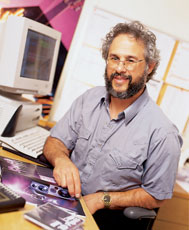|
|
Alone at Home |
July 2001 |
|
If there is one universal truth about personal-studio owners, it's that we wear multiple hats. In some cases, we are the songwriter, arranger, instrumentalist, vocalist, sound designer, engineer, technician, producer, and mastering house, all in one. We might even replicate CDs, create our own record labels, and market and distribute our products. When you add the jobs of bookkeeper, janitor, chief cook, and bottle washer, you realize owning a personal studio can be pretty overwhelming, even if you aren't making your living from it.
Some folks choose to do it all themselves, and I understand the temptation. When working alone, you have full creative control, which means the project can be based on a clear, unified vision. You control your money, the way your music is marketed, and your work pace.
Working alone on a project has its problems, though. To avoid cabin fever from being isolated for too long, take regular breaks and leave the house during off-hours. Another big danger is spending so much time on certain aspects of a project that other parts get shortchanged. For example, it's easy to get lost in the details of gear acquisition and studio maintenance to the point that your projects - the primary reason you built the studio - get delayed. Dealing with those problems is mostly a matter of organizing yourself and setting priorities, but that's easier said than done.
The biggest project killer, however, is getting so close to your project that you overlook any flaws. Falling in love with your work to the point that you can't accept criticism is fatal. I can't count how many times I have heard problem-ridden recordings by good musicians who went off on a tangent and did not ask for feedback until it was too late. Worse are those who ask for feedback and then react to it defensively. If you don't want to hear the answer, don't ask the question. At least, don't ask me!
It should not come as a surprise that I advocate working with other creative people to whatever degree you are comfortable. You might bring in guest musicians, get engineering help, record songs written by others, use an outside mastering engineer and replication service, or work with an indie label. Your creativity can expand into exciting directions when you collaborate on at least part of a project.
But if you do choose to go it alone, at least get feedback from other musicians (and nonmusicians, for that matter) - and take it seriously. I've tested new songs and mixes I thought were almost finished, only to have friends offer valuable suggestions that changed everything. Even one change in a lyric can make all the difference. So be sure to get feedback at an early stage before your project is too far into production, especially if you are trying something new or unusual.
True, you have to follow your muse because in the end, it's your project. Just because your colleagues don't appreciate your concepts doesn't mean your ideas are bad. But given carefully considered opinions from people whose judgment you respect, you'll be better able to anticipate the reaction of an educated audience. Who knows? Maybe you'll learn something that will make your project better. |
